Dianne Feinstein, Longest-Serving Female Senator, Dead At 90
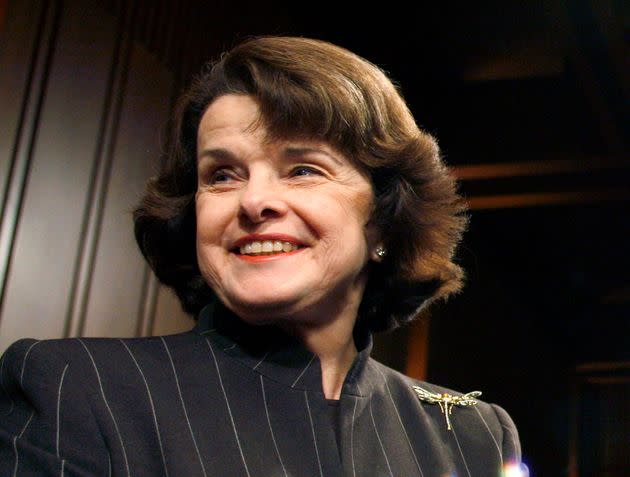
Dianne Feinstein was deeply involved in national security during her time in the U.S. Senate.
Dianne Feinstein, whose decadeslong political career was marked by numerous firsts, has died. She was 90.
Her chief of staff said the senator died at her Washington, D.C., home Thursday night.
“She left a legacy that is undeniable and extraordinary,” James Sauls said. “There is much to say about who she was and what she did, but for now, we are going to grieve the passing of our beloved boss, mentor and friend.”
President Joe Biden, who served with Feinstein in the Senate for over 15 years, called Feinstein a “true trailblazer.”
“Dianne made her mark on everything from national security to the environment to protecting civil liberties,” Biden said. “She’s made history in so many ways, and our country will benefit from her legacy for generations.”
Earlier this year, the senator dealt with a bout of shingles and was absent from the upper chamber for nearly three months. Feinstein experienced complications as a result of the disease, including Ramsay Hunt syndrome — a condition that can paralyze part of the face — and contracted encephalitis during her recovery.
In July, she appeared confused during a vote in the Senate Appropriations Committee. And she was hospitalized as recently as August over a fall in her San Francisco home.
While several Democrats raised concern about her ability to continue serving in light of her declining health, Feinstein defied calls to resign, although she opted not to run for reelection.
Instead, she remained in the Senate, where she was the oldest sitting member of Congress, after a long career in public service.
Feinstein cast a vote as recently as Thursday morning.
Her colleagues held a moment of silence in the upper chamber Friday morning led by Senate Majority Leader Chuck Schumer, who became emotional while delivering remarks on the late senator.
“America is a better place because of” her, the New York Democrat said.
Tributes poured in from California lawmakers.
California Gov. Gavin Newsom (D) called Feinstein a “political giant, whose tenacity was matched by her grace.”
“Feinstein was many things ― a powerful, trailblazing US Senator; an early voice for gun control; a leader in times of tragedy and chaos,” he said in a statement. “But to me, she was a dear friend, a lifelong mentor, and a role model not only for me, but to my wife and daughters for what a powerful, effective leader looks like.”
Former House Speaker Nancy Pelosi (D-Calif.) echoed Newsom, saying that she was “heartbroken” over the news of Feinstein’s death. She described her as a “dear friend.”
“Dianne’s extraordinary career will continue to inspire countless young women and girls to pursue public service for generations to come,” Pelosi said.
Feinstein became San Francisco’s first female mayor in 1978 after then-Mayor George Moscone was murdered along with City Supervisor Harvey Milk in a case that shook the country. Feinstein, who had been the San Francisco Board of Supervisor’s first female president at the time of the shooting, later became one of the most prominent national advocates for gun control. As a U.S. senator, Feinstein introduced the 1994 bill banning assault weapons nationally.
“This is something I’m deeply passionate about, and I believe it saves lives,” she later said. “I don’t intend to stop.”
Biden noted this policy accomplishment in his statement following her death.
“There’s no better example of her skillful legislating and sheer force of will than when she turned passion into purpose, and led the fight to ban assault weapons,” he said.
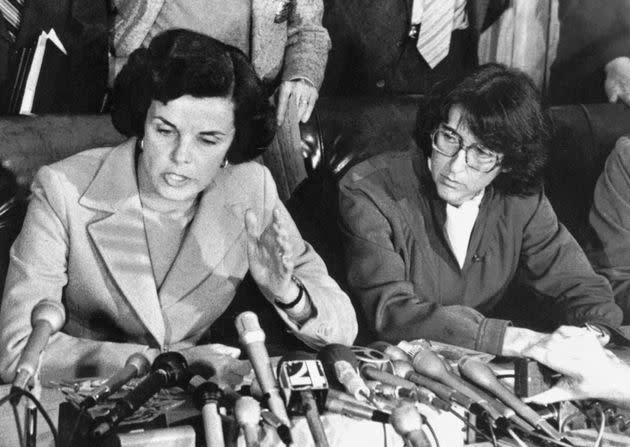
Dianne Feinstein announcing the killings of Mayor George Moscone and City Supervisor Harvey Milk.
Born in 1933 to a family of Eastern European immigrants, Feinstein is Jewish by heritage but attended a prestigious Catholic high school known for championing female empowerment.
She later attended Stanford University, graduating in 1955 with a B.A. in history. It was in college that she discovered her passion for politics, becoming a member of the Young Democrats and serving as her class vice president.
After college, Feinstein joined the public affairs nonprofit the Coro Foundation and, in 1956, married Jack Berman. They had one child, Katherine Feinstein, before they divorced in 1960. Katherine would later follow in her mother’s footsteps as a civil servant, serving as a San Francisco Superior Court Judge for 12 years.
Feinstein took the name of her second husband, neurosurgeon Bertram Feinstein, to whom she was married from 1962 until his death in 1978. In 1980, she married Richard Blum, an investment banker who died in 2022.
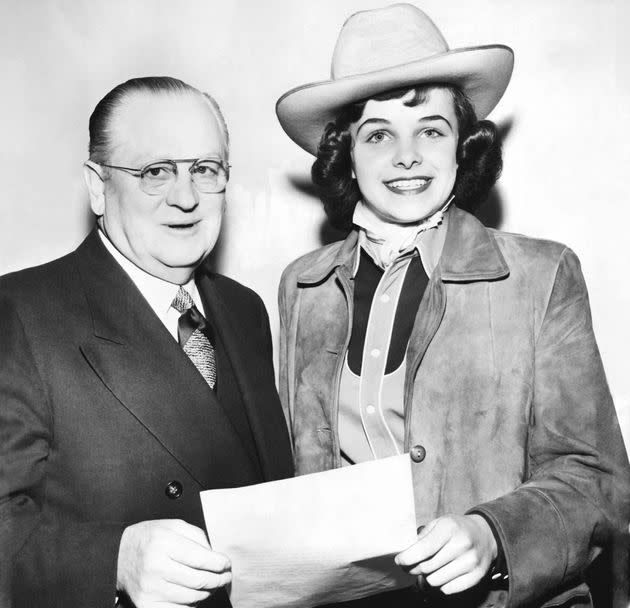
Feinstein, then a high school student named Dianne Goldman, with then-San Francisco Mayor Elmer Robinson.
As the first female mayor of San Francisco, Feinstein oversaw the successful transformation of the city’s cable car system and resoundingly defeated a bitter recall effort.
Her term wasn’t without controversy, though. Feinstein infuriated the gay community when she vetoed a 1982 effort to legalize domestic partnerships. Still, she was considered a generally popular and effective leader and was reelected twice, serving until 1988.
In 1990, Feinstein became California Democrats’ first female candidate for governor. She lost that race but, two years later, ran and won the 1992 special election for U.S. Senate. Along with Barbara Boxer, who was also elected that year, she would become one of the state’s first two female U.S. senators. The two were also the first Jewish women to be elected to the body.
As a senator, Feinstein became deeply involved in national security and made history yet again when she became the first female chairwoman of the Senate Select Committee on Intelligence. Feinstein was one of the few lawmakers to push back against the CIA’s controversial post-Sept. 11 tactics at the time, launching an investigation into their use of torture.
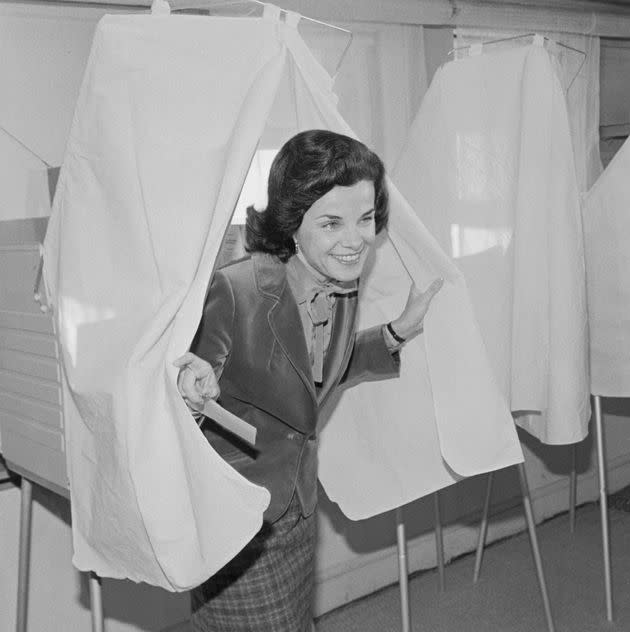
Then-San Francisco Mayor Dianne Feinstein emerges from a voting booth after casting her ballot in a 1979 runoff election between herself and supervisor Quentin Kopp.
“We can’t erase our mistakes by destroying the history books,” Feinstein said after only a portion of the probe’s findings were released. “While this report isn’t easy to read, it offers a vital lesson on what happens when we ignore our values.”
Feinstein was also the first woman to chair the Senate Rules Committee.
A champion for victim’s rights who helped create the AMBER alert system for missing children, Feinstein was known for being tough on crime. She was criticized for leaning farther right than many of her Democratic colleagues on issues like the war on drugs and immigration.
She also drew ire from progressives over her defense of the National Security Agency’s mass surveillance program and her characterization of NSA leaker Edward Snowden as a traitor.
Feinstein was nevertheless a well-liked official, winning reelection four times. In 2012, she shattered the record for the most popular votes in Senate election history.
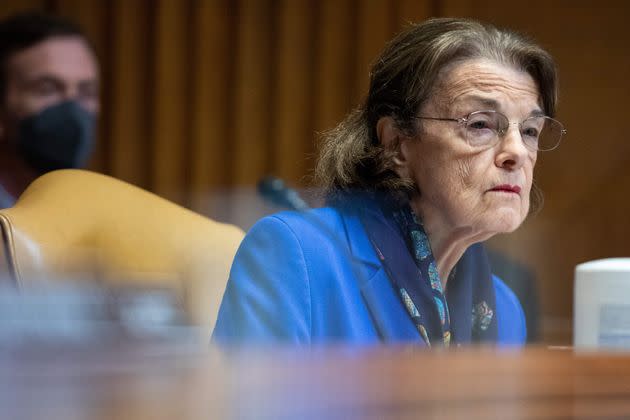
Feinstein faced criticism for missteps during the confirmation hearings for Supreme Court Justice Amy Coney Barrett.
Though this would change during her final years in office, many praised Feinstein for seemingly never slowing down.
As one former staffer told the San Francisco Chronicle in 2011, “she has more energy and discipline than I do, and I’m 34.”
“Some people show age differently than others, no question about that,” Feinstein, then 78, told the Chronicle at the time. “You can be very old at 50 and you can be very young at 90. I really believe that. It depends on your brain, it depends on your health, it depends on your drive, on your determination and your motivation.”
When Alaska Rep. Don Young died in 2022, an 88-year-old Feinstein became the oldest sitting member of Congress. She filed paperwork to run for reelection in 2024, when she would be 91 years old.
But concerns about Feinstein’s mental fitness continued, and began circulating publicly in 2020. An instance where she repeated the same question word-for-word during a hearing raised red flags about possible memory loss, and some missteps during the confirmation hearing for Supreme Court Justice Amy Coney Barrett triggered even more public concern.
Multiple senators and colleagues of Feinstein’s expressed their concerns about her to the San Francisco Chronicle in 2022. They said she sometimes appeared to forget who she was speaking with mid-conversation and seemed not to recognize senators she’d worked with for decades.
At the time, she blamed the struggles on the death of her husband.
“The last year has been extremely painful and distracting for me, flying back and forth to visit my dying husband who passed just a few weeks ago,” she told the San Francisco Chronicle. “But there’s no question I’m still serving and delivering for the people of California, and I’ll put my record up against anyone’s.”
After she faced multiple health issues this year, news emerged that the late senator handed her daughter, Katherine Feinstein, limited power of attorney. On behalf of her mother, the younger Feinstein sued the trustees overseeing the senator’s late husband’s estate and claimed she was a victim of financial elder abuse.
Earlier this year, multiple prominent lawmakers announced plans to run for Feinstein’s seat, including California Reps. Katie Porter, Adam Schiff and Barbara Lee.
In the meantime, Newsom will appoint her successor.
He had previously said he would make an “interim appointment” if Feinstein were to resign to avoid interfering with the primary slated for March. The governor added he would stick by his pledge to select a Black woman.

